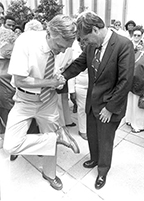
Florida lawmakers should look at bringing back runoff primary elections, our Capitol Columnist writes.
Bill Cotterell
©2024 The News Service of Florida. All rights reserved; see terms.
It’s probably not wise to roll out a 44-page package of changes in Florida’s election laws in the last few weeks of a legislative session, but it’s too bad House members couldn’t have salvaged the restoration of runoff elections.
That idea died with a few other things in a bill that popped up suddenly — and sank just as quickly — in the House State Affairs Committee. But it would be good if the idea gets a thorough hearing next year.
Historically, Florida was among a handful of mostly southern states requiring runoffs if no candidate got at least one vote over 50 percent in a primary. In a crowded field, unless there was a powerful incumbent or some celebrity superstar, three or four candidates might splinter the turnout — so then the top two contenders would slug it out about a month later.
The state ended runoffs in 2002. Keeping polls open 12 hours for a tiny trickle of voters in a runoff cost the same as running any other election, and the first-round leader usually prevailed in the elimination round, so why bother?
But there were notable exceptions, like Lawton Chiles and Reubin Askew. Both men were little-known state senators in 1970, when Chiles ran for the U.S. Senate and Askew went for governor. They trailed more-famous Democrats in the first go-round — former Gov. Farris Bryant leading Chiles for the Senate and Attorney General Earl Faircloth ahead of Askew for governor — but they leapfrogged the leaders and went on to become two of Florida’s most distinguished leaders.
The same happened eight years later. Florida Attorney General Bob Shevin, with two statewide victories behind him, led the Democratic race for governor over a less-known state senator from Miami Lakes, Bob Graham — who would slingshot past Shevin in the runoff and win two terms as governor and three in the U.S. Senate.
Runoffs also work the other way, showing when an incumbent is in trouble. Republican Gov. Claude Kirk had to fight off two challengers in the 1970 GOP primary. He survived, but being forced into a runoff for his own job weakened Kirk considerably, and Askew knocked him off in November.
A solution for the current situation might be suggested by a GOP runoff that never was. In 1994, Jeb Bush polled 47 percent of the Republican vote for governor in a seven-way primary. Former Attorney General Jim Smith was a distant second at 18 percent and — realistically assessing the staggering odds against him — decided to concede the runoff to Bush.
Maybe legislators could do that this time — only have runoffs if the runner-up candidate is within 10 or 15 percentage points of the first-round leader.
Bush lost in 1994 to Chiles but won four years later — which was, coincidentally, the election that gave Republicans control of the executive branch, along with both legislative chambers.
Perhaps not so coincidentally, they set about making lots of changes — like ditching runoffs. The conventional wisdom around the Capitol was that U.S. Attorney General Janet Reno was sure to be the Democratic nominee against Bush in 2022, so the GOP-run Legislature sought to smooth the way for her by getting rid of that pesky runoff requirement
This being Florida, of course, they should have expected the unexpected. There was a three-way Democratic primary and attorney Bill McBride wound up beating Reno 44.4 percent to 44 percent. If there’d been a runoff, the better-known Reno probably would have beaten McBride, but it probably wouldn’t have mattered much against Bush.
The same speculation might be apt for 2018. Former Tallahassee Mayor Andrew Gillum led a field of five Democrats and, if there had been a runoff, ex-U.S. Rep. Gwen Graham might well have caught him. Black voters rallied strongly behind Gillum, though, and he became the nominee — narrowly losing to Gov. Ron DeSantis.
Restoring runoffs could be crucial in two years, especially for the Republicans. All three Cabinet officers and two members of Congress are plausible candidates for governor, meaning somebody could win the GOP nomination with a small segment of the vote if there’s no second round.
But the best reason for returning runoffs is simple math. Winning a nomination with 33 or 40 percent support is nice, but if you’re going to be the nominee of a party, you ought to get the votes of at least half of the members casting ballots — even if it takes two tries.
Bill Cotterell is a retired capitol reporter for United Press International and the Tallahassee Democrat. He can be reached at bcotterell@govexec.com.


Be the first to comment